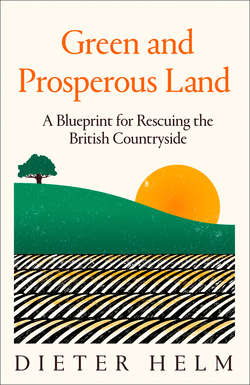Читать книгу Green and Prosperous Land - Dieter Helm, Dieter Helm - Страница 14
2 BUSINESS-AS-USUAL
ОглавлениеImagine waking up in May 2050. You might remember the May mornings before 2020. This was a time of bright yellow oilseed rape fields. There were still some swallows, a few swifts and the occasional cuckoo. In the right place you might have heard a curlew. If you were really lucky you might have seen a spotted flycatcher. In 2050 it will be very different if we go on as we are. By then, all these birds will be rarities. There will be even fewer insects, agriculture will be more intensive and the fields barren of anything but the chosen crop.
There will be 5 million more houses, and little left of the Green Belt, except perhaps in name. Lots more roads, railway lines, solar panels and wind turbines will have industrialised the countryside. There will be very few wild salmon left, but lots of fish farms and more Trump-style golf courses. Nature will be ever-more confined to reserved areas – like zoos in an increasingly urban and industrial landscape.
There will be compensations. You will have communications technologies that cannot even be imagined today, just as I have an iPhone now, which was unimaginable a couple of decades ago. Everything will be digital, with robots, 3D printing and artificial intelligence (AI) fulfilling many of your needs. You will know your genome, and have medical treatments available to you that again are hard to imagine now.
Some economists continue to think that the natural capital you will have lost is a price worth paying for all these new benefits. But much of this can’t be simply substituted, because natural capital is not like that, open to a marginal loss here and a marginal loss there. Nature isn’t marginal, and it does not come in discrete bits to trade off against discrete bits of man-made and human capital. Worse still, it might bite back: you may know your genome, but you might not have any antibiotics that work.
This is the silent, grey and impoverished natural world we could leave to the next generation. It is what it might look like if we don’t act now, and confront the stark reality that we face if current trends continue. We cannot and should not shy away from thinking through what will happen if we carry on damaging nature and allowing our stock of natural capital to continue to decline. It is not just about the loss of nature, and all the spiritual and emotional underpinnings to what makes us fully human, but about our economic prosperity, which depends on nature and natural capital. The land would be a dull, brown and unprosperous land – and a lot less appealing to share pictures of on whatever replaces Instagram by then. We really would need a virtual and screen-based reality to console ourselves with.
Being brown, not green, means a lower level of sustainable economic growth, and perhaps even no growth at all. It is against this background that the case for nature is to be seen as a great opportunity to make us all better off: better off in a narrow economic sense, as well as a wider sense. May 2050 could be noisier and more vibrant and exciting than May 2020, and more prosperous too. But not unless we make this happen.
